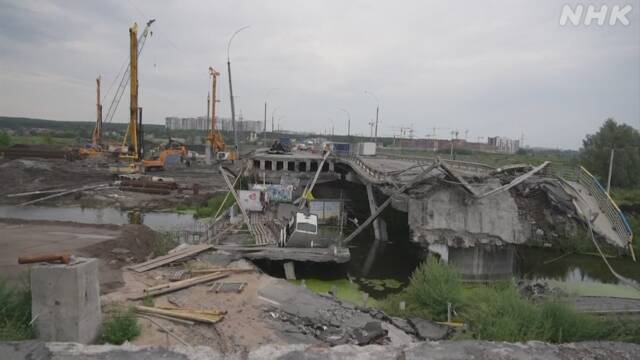On the 24th, half a year has passed since Russia's military invasion of Ukraine, and Western countries have announced new military assistance to Ukraine one after another.
On the other hand, Russia's Putin administration has reiterated its stance of continuing military aggression and is strengthening its domination of Ukraine as a fait accompli.
In Ukraine, six months after Russia's military invasion, on the 24th, the Russian army continued to be wary of intensifying attacks, and even in the capital Kyiv, air defense alarms were often sounded, and citizens were seen evacuating to underground passages.
Ukrainian President Volodymyr Zelensky, speaking online at a UN Security Council meeting in New York, said at least 15 people were killed and around 50 injured in a Russian attack on a railway station in eastern Dnipropetrovsk province. said he did.
"This is our daily life. This is what Russia has prepared for today's Security Council meeting," Zelensky said, blaming Russia.
"If we don't stop Russia now in Ukraine, the Russian killers will reach Europe and beyond. Our independence is your security and the security of the whole world," he said. He appealed to society for support and cooperation.
Under these circumstances, British Prime Minister Johnson visited Kyiv and met with President Zelensky to announce additional military support of approximately 8.7 billion yen in Japanese yen, including 2,000 state-of-the-art drones.
In addition, the Biden administration in the United States has announced additional military assistance of more than 400 billion yen in Japanese yen to Ukraine, which is said to be the largest amount of assistance since the invasion began.
In addition, the German government also announced that it will provide weapons worth approximately 68 billion yen in Japanese yen, such as rocket launchers and air defense systems.
The US and European countries have made it clear that they will support Ukraine as it prepares for a long-term war.
In response to this, Russian Defense Minister Shoigu said on the 24th that "the special military operation will proceed as planned and all goals will be achieved," emphasizing that the military invasion will be pushed forward.
Putin also sent a message to parents of children aged 6 to 18 years old on the 24th before the start of the new school year in Donetsk, Luhansk and Kharkiv in eastern Ukraine, as well as Kherson in the south and Zaporizhia in the southeast. He announced that he would provide 10,000 rubles, or about 23,000 yen in Japanese yen, as a lump-sum payment for education.
The Putin regime continues its military aggression as well as consolidating its dominance in Ukraine.
Expert: 'Very likely to be a war with no winners'
Jun Tago, a professor at Waseda University who studies the factors that cause wars, said that Russia's military aggression would lead to a loss of national power, and the leader, who felt a sense of urgency, should try to recover by launching a war. He points out that it is a form of war that has been seen in history, and that it may be prolonged for more than a year.
In this, Professor Tago said in relation to Russia's military invasion of Ukraine, They have the motive to attack the country," he said. Against the background of Russia's declining national power in economic and other areas, President Putin has heightened his vigilance against Ukraine, which receives aid from Europe and the United States. I pointed out that there is.
Such cases of wars initiated by leaders with a sense of crisis in an attempt to make amends are seen in more than 100 wars that have occurred since the 19th century.
Professor Tago said, "It is a common theory in international political science that the way a war ends depends on what motivated it to start. If that is the case, the war will continue until that is achieved.
On the other hand, President Zelensky also said, ``If we come this far, it will not be possible to have half-hearted negotiations. I don't see an end in sight.
Prof. Tago also commented on the path to the end of the war, saying, ``Isn't it likely that the state of war will continue, including a truce, like the Korean War? There are only two ways to end, either trying to draw a line and agreeing to negotiations."

